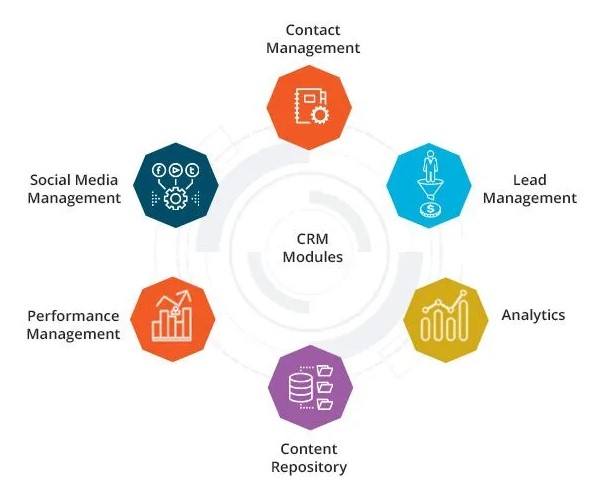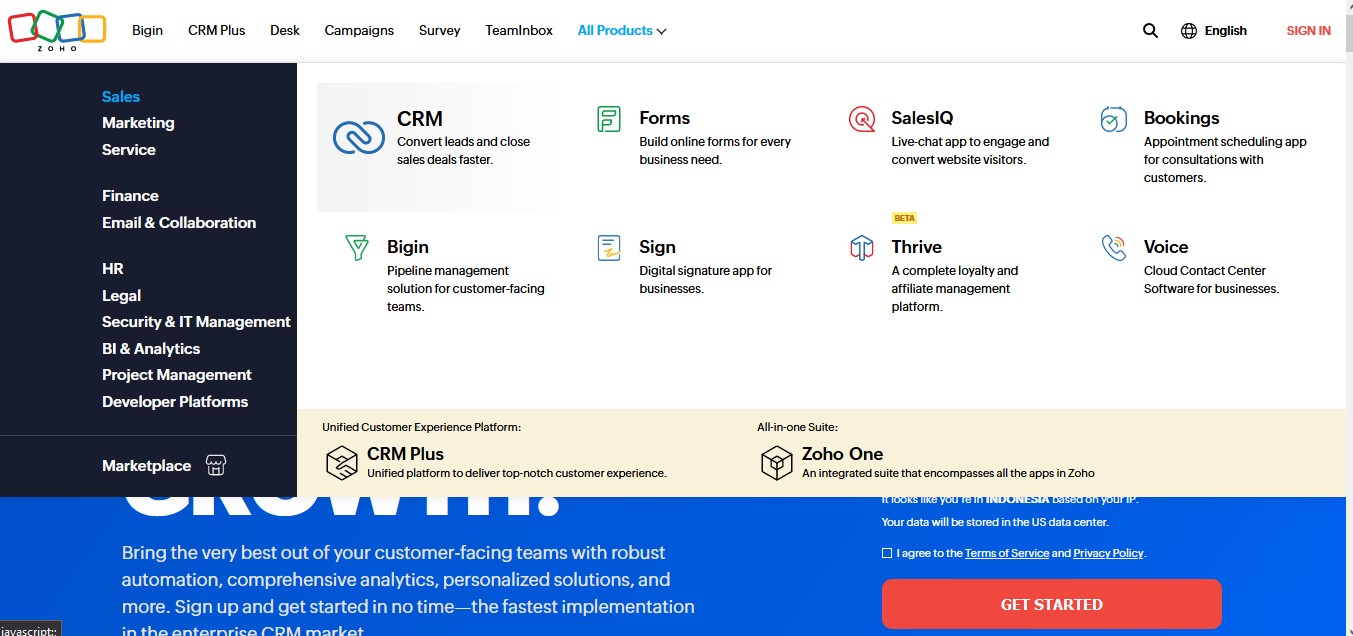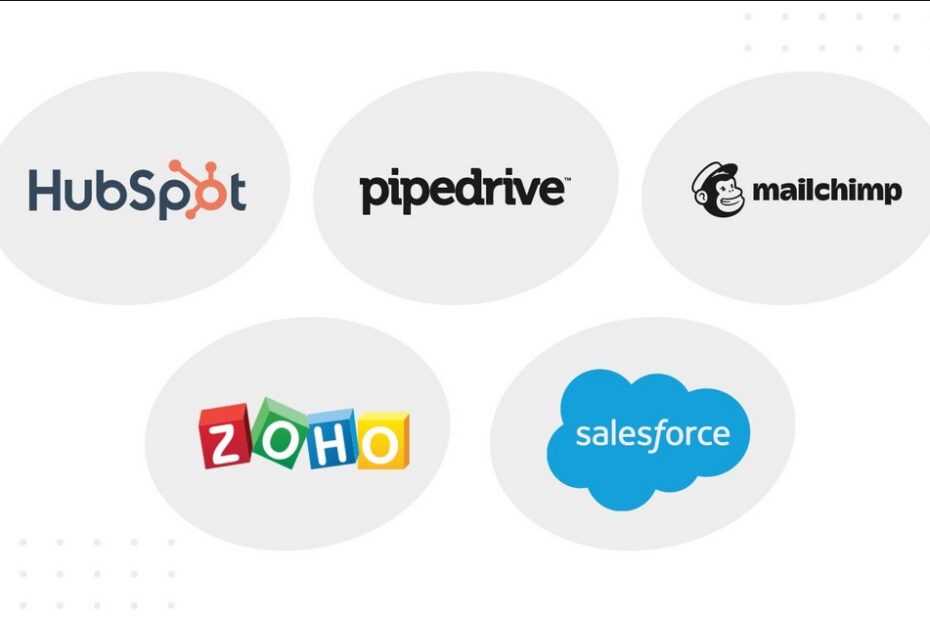Running a small business can be both exhilarating and challenging. As an entrepreneur, you are constantly juggling multiple tasks, from managing your team to keeping track of sales and customer data. In today’s digital age, having the right tools in place is essential for success, and one such tool that can greatly streamline your operations is Customer Relationship Management (CRM) software. With so many options available on the market, finding the best CRM software for your small business can feel overwhelming. But fear not! In this article, we have done the research for you and compiled a list of top CRM software solutions that will help you effectively manage your customer relationships while staying within budget. So let’s dive in and find the perfect CRM software to take your small business to new heights!
The Importance of CRM for Small Businesses
CRM, or Customer Relationship Management, is crucial for small businesses for several reasons. Firstly, CRM helps businesses build and maintain strong relationships with their customers. By keeping track of customer interactions, preferences, and purchase history, businesses can personalize their approach and provide better customer service. This leads to increased customer satisfaction and loyalty 
Secondly, CRM enables small businesses to improve their sales and marketing efforts. By analyzing customer data and patterns, businesses can identify potential leads and target them with tailored marketing campaigns. This not only increases the chances of converting leads into customers but also helps in upselling and cross-selling to existing customers.
Lastly, CRM provides valuable insights into business performance. It allows small businesses to track key metrics such as sales revenue, customer acquisition costs, and customer retention rates. With this information at hand, businesses can make informed decisions about resource allocation, identify areas for improvement, and ultimately drive growth.
In conclusion, CRM plays a vital role in the success of small businesses by helping them establish strong customer relationships, improve sales and marketing efforts, and gain valuable insights into business performance. Investing in a CRM system can greatly benefit small businesses in today’s competitive market.
Features to Consider in CRM Software
When choosing a CRM software, there are several important features to consider. First and foremost, it is crucial to ensure that the software offers comprehensive contact management capabilities. This includes the ability to store and organize customer information such as names, addresses, phone numbers, and email addresses. Additionally, look for features that allow you to track interactions with customers, such as calls or emails.
Another key feature to consider is sales automation. A good CRM software should have tools that streamline the sales process, such as lead management and opportunity tracking. These features can help your sales team stay organized and prioritize their efforts effectively.
Lastly, integration capabilities are essential when choosing a CRM software. Look for a system that can seamlessly integrate with other tools your business uses, such as email marketing or project management software. This will ensure smooth data flow between different systems and improve overall efficiency.
Overall, considering these features will help you choose a CRM software that meets your business needs and helps you effectively manage customer relationships.
Top CRM Software Options for Small Businesses
There are several top CRM software options available for small businesses. One highly recommended option is HubSpot CRM. It offers a user-friendly interface and is free to use, making it an excellent choice for small businesses on a budget. HubSpot CRM also integrates with other HubSpot tools, allowing for seamless data management and marketing automation.

Another popular CRM software for small businesses is Zoho CRM. It offers a wide range of features such as contact management, sales pipeline tracking, and email integration. Zoho CRM also has affordable pricing plans tailored to the needs of small businesses, making it a cost-effective choice.
Lastly, Salesforce Essentials is another great option for small businesses. It provides all the essential CRM features in a simple and intuitive interface. With Salesforce Essentials, small businesses can easily manage customer relationships, track sales activities, and generate reports to analyze their business performance.
Ultimately, the best CRM software option for your small business will depend on your specific needs and budget. It’s important to consider factors such as ease of use, integration capabilities, and pricing when making your decision.
Pros and Cons of Each CRM Software
When it comes to CRM software, there are several options available in the market, each with its own set of pros and cons. One popular CRM software is Salesforce. The pros of Salesforce include its extensive features and functionalities, scalability for businesses of all sizes, and a user-friendly interface. However, one potential con of Salesforce is its high cost, especially for small businesses with limited budgets.
Another CRM software worth considering is HubSpot. The pros of HubSpot include its comprehensive marketing automation tools, integration with other HubSpot products, and a free version available for small businesses. On the downside, some users find HubSpot’s reporting capabilities to be lacking compared to other CRM software options.
Ultimately, the choice of CRM software depends on your specific business needs and budget constraints. It’s important to thoroughly research and compare different options before making a decision to ensure you choose the right CRM software that aligns with your goals and requirements.
Factors to Evaluate Before Choosing CRM Software
When evaluating CRM software, there are several factors that you should consider before making a decision. Firstly, it is important to assess your specific business needs and goals. Different CRM software may offer different features and functionalities, so it is crucial to align these with your requirements. For example, if you are primarily focused on sales and lead management, look for a CRM software that offers robust sales automation tools.
Secondly, consider the scalability of the CRM software. As your business grows, you will need a system that can accommodate increasing customer data and user numbers. Look for a CRM solution that allows for easy customization and integration with other business applications.
Lastly, it is essential to evaluate the user-friendliness of the CRM software. Your team will be using this system daily, so it should be intuitive and easy to navigate. Consider conducting demos or trials to get a feel for the user interface and overall usability of the software.
By considering these factors – aligning your business needs, assessing scalability, and evaluating user-friendliness – you can make an informed decision when choosing CRM software that best fits your organization’s requirements.
Tips for Implementing CRM in Your Small Business
Implementing a CRM (Customer Relationship Management) system in your small business can greatly improve your customer interactions and overall efficiency. Here are some tips to help you successfully implement CRM:

1. Define your goals: Before implementing CRM, clearly define what you want to achieve with the system. Whether it’s improving customer satisfaction, increasing sales, or streamlining processes, having specific goals will guide your implementation strategy.
2. Choose the right CRM software: There are many CRM software options available, so take the time to research and choose one that best fits your business needs. Consider factors such as ease of use, scalability, integration capabilities, and cost.
3. Train your team: Proper training is crucial for successful CRM implementation. Make sure all employees who will be using the system understand how to effectively use it to benefit both themselves and the business. Provide ongoing support and encourage feedback to address any concerns or challenges that may arise.
By following these tips, you can effectively implement a CRM system in your small business and reap its benefits in terms of improved customer relationships and increased productivity.
Why CRM software is important for small businesses
CRM software is important for small businesses because it helps them streamline their customer relationship management processes. With CRM software, small businesses can easily manage and organize their customer data, track interactions with customers, and automate various tasks such as sending follow-up emails or scheduling appointments. This not only saves time but also improves the overall efficiency of the business.
Moreover, CRM software allows small businesses to gain valuable insights into their customers’ preferences and behaviors. By analyzing the data collected through CRM software, small businesses can better understand their target audience, identify trends, and make data-driven decisions. This information can help them personalize their marketing efforts, improve customer satisfaction, and ultimately increase sales and revenue. In today’s competitive market, having a CRM system in place is crucial for small businesses to stay organized, provide excellent customer service, and grow their business effectively.
Ease of use: User-friendly interface and features
When it comes to ease of use, a user-friendly interface and features are essential. A well-designed interface should be intuitive and easy to navigate, allowing users to quickly find what they need without any confusion. It should also have clear instructions and labels, making it easy for users to understand how to use the different features.
In addition to a user-friendly interface, having useful features that enhance the user experience is crucial. Features such as drag-and-drop functionality, customizable settings, and shortcuts can greatly improve usability. These features allow users to personalize their experience and perform tasks more efficiently.
Overall, a software or platform that prioritizes ease of use with a user-friendly interface and useful features will not only attract more users but also ensure that they have a positive experience while using the product.
Cost-effectiveness: Affordable options for small budgets
When working with a small budget, it’s important to prioritize cost-effectiveness and find affordable options that still deliver value. One option is to focus on DIY solutions. Whether it’s building your own website, creating your own marketing materials, or managing your own social media accounts, taking on these tasks yourself can save you money while still achieving your goals.

Another cost-effective option is to leverage the power of technology. There are countless free or low-cost tools available online that can help streamline your operations and improve efficiency. From project management software to email marketing platforms, these tools can help you automate tasks, stay organized, and reach your target audience without breaking the bank.
Lastly, consider partnering with other small businesses or freelancers who offer complementary services. By collaborating with others in similar situations, you can pool resources and share costs while still delivering high-quality products or services to your customers. This not only helps reduce expenses but also allows for cross-promotion and access to a wider network of potential clients.
In conclusion, when working with a small budget, it’s important to think creatively and explore affordable options that still deliver value. By embracing DIY solutions, leveraging technology, and collaborating with others in similar situations, you can make the most out of limited resources and achieve success without overspending.
When it comes to cost-effective CRM options for small budgets, there are a few affordable solutions worth considering. One option is to look into cloud-based CRM systems, such as Zoho CRM or HubSpot CRM. These platforms offer free or low-cost plans that provide basic features and functionality, making them suitable for small businesses with limited budgets.
Another cost-effective approach is to consider open-source CRM software. Open-source solutions like SuiteCRM or Odoo allow businesses to customize and tailor the CRM system according to their specific needs without incurring expensive licensing fees. While open-source software may require some technical expertise to set up and maintain, it can be a more affordable option in the long run.
Regardless of the chosen solution, it’s important for small businesses with limited budgets to prioritize their CRM needs and focus on key functionalities that align with their business goals. By doing so, they can find an affordable CRM option that meets their requirements without breaking the bank.
Customization: Ability to tailor the software to specific needs
One of the key advantages of a customization CRM is the ability to tailor the software to specific needs. This means that businesses can customize the CRM system to match their unique processes and workflows, rather than having to conform to a one-size-fits-all solution. By customizing the CRM, businesses can improve efficiency and productivity by streamlining processes and automating repetitive tasks.
Additionally, customization allows businesses to capture and track data that is relevant to their specific industry or business model. This enables them to gain deeper insights into customer behavior and preferences, which can be used to personalize marketing campaigns and improve customer satisfaction. Overall, a customization CRM provides businesses with greater flexibility and control over their customer relationship management strategies, resulting in improved performance and profitability.
Integration: Seamless integration with other business tools
CRM integration refers to the ability of a CRM system to seamlessly connect and share data with other business tools. This is crucial for businesses as it allows for better coordination and efficiency across different departments and systems.
A well-integrated CRM system can connect with various tools such as email marketing software, customer support platforms, project management tools, and accounting software. This integration enables businesses to streamline their processes, eliminate manual data entry, and ensure that all relevant information is available in one central location.
By integrating their CRM with other business tools, companies can achieve a more holistic view of their customers and improve overall customer experience. For example, integrating CRM with email marketing software allows businesses to send personalized emails based on customer preferences and purchase history. Similarly, integrating CRM with customer support platforms ensures that support agents have access to complete customer information, leading to faster issue resolution.
In conclusion, seamless integration with other business tools is essential for a CRM system to maximize its effectiveness. It enables businesses to leverage the power of multiple systems together, resulting in improved productivity and enhanced customer satisfaction.
Customer support: Responsive and helpful customer service
CRM customer support is crucial for businesses as it ensures that customers receive responsive and helpful assistance when they encounter any issues or have inquiries. A responsive customer service team promptly addresses customers’ concerns, acknowledging their queries or complaints in a timely manner. This not only shows that the company values its customers but also helps build trust and loyalty.
Moreover, helpful customer service goes beyond just acknowledging issues; it involves providing effective solutions to resolve them. A knowledgeable and well-trained support team can guide customers through troubleshooting steps or provide detailed explanations to address their concerns. By offering proactive assistance and going the extra mile to ensure customer satisfaction, businesses can enhance their reputation and foster long-term relationships with their clients. Ultimately, CRM customer support plays a vital role in maintaining a positive brand image and driving customer loyalty.
Top recommendations: List of best CRM software options for small businesses
Here are some top recommendations for CRM software options for small businesses:
1. HubSpot CRM: HubSpot offers a free CRM that is perfect for small businesses looking to manage their customer relationships effectively. It provides features like contact management, deal tracking, email integration, and reporting. Plus, it seamlessly integrates with other HubSpot tools, making it a comprehensive solution.
2. Zoho CRM: Zoho CRM is another great option for small businesses as it offers a range of features at an affordable price point. It includes lead and contact management, sales pipeline tracking, email marketing automation, and analytics. Additionally, Zoho CRM integrates with other popular business tools like G Suite and Mailchimp.
3. Salesforce Essentials: While Salesforce is often associated with larger enterprises, they also have a small business offering called Salesforce Essentials. This CRM solution provides basic functionalities like contact management, opportunity tracking, email integration, and customizable dashboards. It’s user-friendly and scalable as your business grows.
Ultimately, the best CRM software for your small business will depend on your specific needs and budget. These options mentioned above are highly regarded in the market and offer robust features to help streamline your customer relationship management processes.
Choose the right CRM software for your small business
When choosing a CRM software for your small business, there are several factors to consider. Firstly, assess your specific needs and goals. Are you looking for a CRM that focuses on sales automation, customer service management, or marketing campaigns? Understanding what you require from the software will help narrow down your options.
Secondly, consider scalability and flexibility. As a small business, you may not have extensive resources or a large team. Therefore, it is essential to choose a CRM that can grow with your business and adapt to your changing needs. Look for software that offers customizable features and integrations with other tools you use.
Lastly, consider the cost and ease of use. Small businesses often have limited budgets, so it’s important to find a CRM software that provides value for money. Look for affordable options that offer the necessary features without unnecessary complexity. Additionally, consider whether the software offers training and support to ensure smooth implementation and user adoption within your organization.
Overall, choosing the right CRM software for your small business requires careful consideration of your specific needs, scalability options, cost-effectiveness, and ease of use. By evaluating these factors in relation to different CRM options available in the market, you can make an informed decision that aligns with your business objectives and budgetary constraints.
Conclusion
In conclusion, choosing the right CRM software for your small business can make a significant impact on how you manage customer relationships and drive growth. It’s important to consider factors such as scalability, ease of use, customization options, and customer support when making your decision.
While there are numerous CRM options available in the market, some stand out for their user-friendly interface and robust features specifically designed for small businesses. HubSpot CRM is an excellent choice for its seamless integration with other HubSpot tools and its free tier that provides essential functionalities without any cost. On the other hand, Zoho CRM offers a range of affordable plans with advanced features like workflow automation and lead scoring to help you streamline your sales process effectively.
Ultimately, what works best for your small business will depend on your unique needs and budget constraints. Take the time to evaluate different CRM solutions and consider factors such as ease of implementation, ongoing maintenance requirements, and training resources before making a decision. With the right CRM software in place, you can revolutionize how you interact with customers, boost productivity within your team, and position yourself for long-term success.
